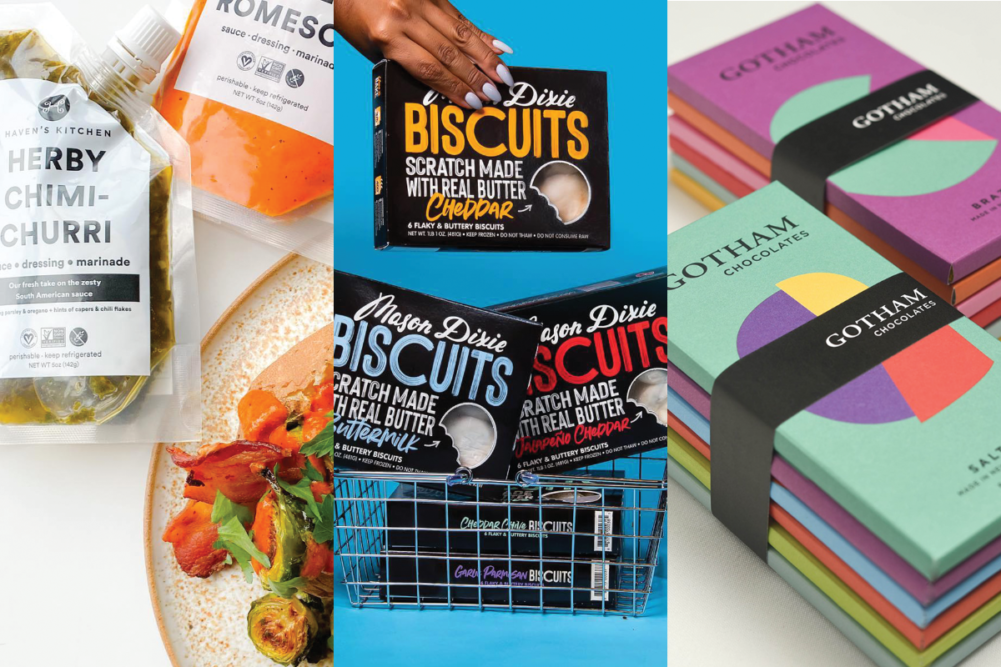KANSAS CITY — The past few months have seen a handful of high-end eateries and foodie destinations entering the consumer packaged goods market. New York City’s Levain Bakery launched its famed cookies in the freezer aisle of select grocery stores. Carbone, an upscale Italian restaurant in New York, Miami, Las Vegas and Hong Kong, is rolling out premium pasta sauces online and in East Coast outlets. The chef behind Chicago-based Girl and the Goat, Little Goat and Duck Duck Goat restaurants introduced a line of condiments for home cooks.
“A lot of businesses are trying to figure out how to expand beyond the four walls,” said Alison Cayne, founder and chief executive officer of Haven’s Kitchen, based in New York. “There’s a lot of movement in the hospitality world to figure out the product side of things.”
The activity extends beyond traditional licensing deals between national restaurant chains and packaged food manufacturers, which have produced such items as Chick-fil-A bottled sauces, Taco Bell tortilla chips and California Pizza Kitchen frozen pizzas for supermarkets across the country. As the pandemic broadly halted indoor dining, a number of independent restaurant owners began seeking ways to package and sell products online or in grocery stores, Ms. Cayne noted.
“There are behemoth brands … that had something in the works but have put the pedal to the metal a little bit,” she said. “Others are doing it as a result of the pandemic.”
Her business, Haven’s Kitchen, offers a range of refrigerated sauces sold nationwide at retailers including Target and Whole Foods Market. The recipes were inspired by popular classes at the cooking school, cafe and private event venue of the same name, which she opened and operated for eight years.
She closed the space last summer as a result of the pandemic and is focusing full-time on the consumer products business. Among factors to consider when expanding onto retail shelves are packaging, pricing and production, Ms. Cayne said.
“I get so many calls from people who have, say, a pesto and have to figure out how to ship and get it on grocery store shelves,” Ms. Cayne said. “If you’re looking to do something quick and dirty and get some cash, a fresh pesto is not the solution there. You need something shelf-stable, something with good margins, something that doesn’t require fresh ingredients.”
Starved of travel and dining experiences, some consumers are craving chef-crafted options to enjoy safely at home. Hundreds of foodservice operators began selling signature items on Goldbelly.com, an online marketplace featuring foods from restaurants, bakeries and delis nationwide. The number of makers on the site more than doubled last year, and the platform gained more than one million new customers, according to the company.
A fine-dining institution in Manhattan’s West Village, Gotham Bar & Grill launched a line of gourmet chocolates last year on Faire.com, an online wholesale marketplace connecting over 150,000 retailers with emerging and established brands. The company said its packaged chocolate operation “brought our kitchen back to life while waiting for our great city to reopen.”
Such platforms are providing opportunities for restaurant owners to generate revenue during the pandemic. However, operators may not understand the complexity of pivoting or expanding into packaged foods, said Ayeshah Abuelhiga, founder and CEO of Mason Dixie Biscuit Co., Baltimore.
“It’s not easy,” she said. “That’s the misconception. Everyone thinks they can just put it in a jar or bag and go to Whole Foods. That’s not how it works anymore.”
She hadn’t initially planned to launch a grocery brand, but a year after opening her Southern comfort food concept, customers began asking for her biscuit dough to bake at home. Demand heated up quickly.
“We were still trying to get a full-fledged restaurant up and running,” Ms. Abuelhiga said. “We didn’t plan to have this consumer product brand go national.”
Five years later, Mason Dixie frozen biscuits, scones, rolls and handhelds are sold at more than 6,000 retailers nationwide. The restaurant closed last year.
For Ms. Abuelhiga, a key to a successful entry into the retail market was identifying a business partner to supplement her strengths.
“It’s very hard to launch from a restaurant to a consumer brand without having some level of business development and marketing experience,” Ms. Abuelhiga said. “Don’t launch into this alone; find a partner who has the assets you don’t… You need to have expertise, and don’t go into it thinking you can do everything because one of the businesses will suffer.”

